Self-Driving Taxis And Clean Transportation: Annual Conference Showcases The Changing Mobility World
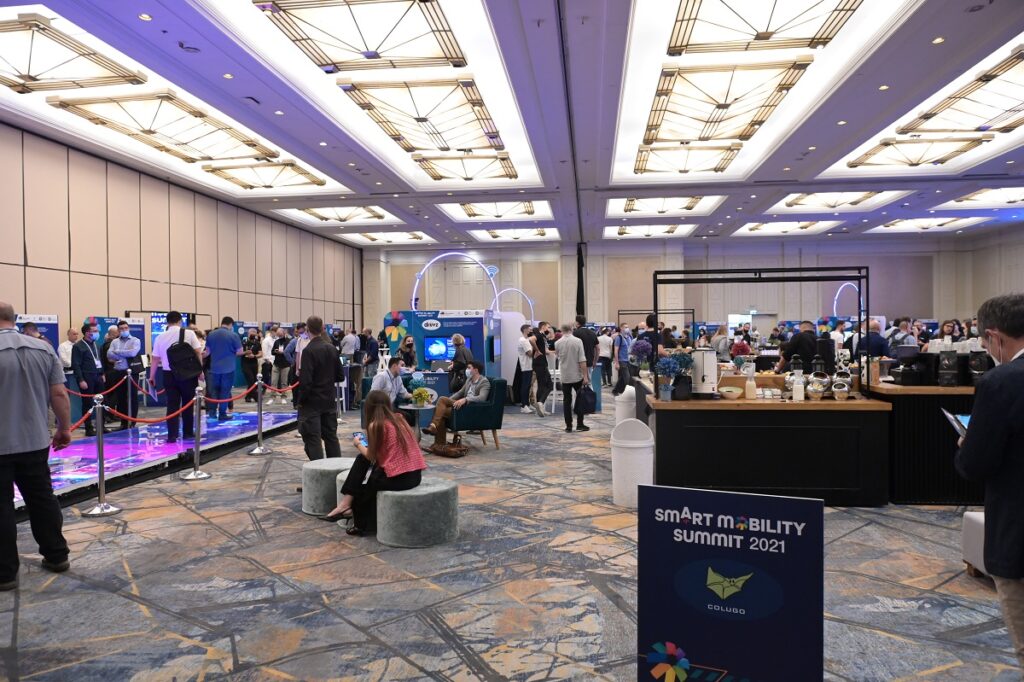
The global COVID-19 pandemic compelled many to take a brief pause as the world began to welcome in a new normal. Smart mobility, meanwhile, moved full speed ahead with plans for robotaxis, delivery drones, electric vehicles, and clean transportation.
This year’s international Smart Mobility Summit, with the theme “Innovation In Motion,” recognized the changing mobility landscape and advancement in the sector as entrepreneurs, investors, carmakers, and government officials returned to Tel Aviv for the eighth time to discuss smart mobility solutions and transportation initatives following a one year hiatus in 2020. The summit, organized and produced by the Smart Mobility Initiative in the Prime Minister’s Office, in collaboration with the Ministry of Science, the Ministry of Economy and Industry, the Ministry of Foreign Affairs and Keren Hayesod, returned in a hybrid format from November 8-9 with more than 5,000 participants from 60 countries.

The event dealt with some of the biggest trends in the automotive and smart transportation world, including the impact of artificial intelligence in the mobility sector, the future of micromobility — small, lightweight vehicles like scooters in place of cars — and the focus on cameras, sensors, radars, and LiDAR to power self-driving vehicles. Speakers at the conference also pushed for the disruption of energy and transportation technologies to better global and enivromental challenges such as congestion, pollution, and road accidents.
Distinguished local and international speakers highlighted their government’s, organization’s or company’s plans to bring smart mobility to a higher level. Top speakers included Amnon Shashua, founder of Mobileye, Yossi Matias, Google VP and Head of Artificial Intelligence, Yunseong Hwang, Head of Innovation at Hyundai, Arkady Wolutz, CEO of Yandex, and Dror Bin, CEO of the Israel Innovation Authority.

Panel discussions also highlighted topics such as technological challenges in the industry, unmanned vehicles, mobility as a service (MaaS), traffic management, cybersecurity solutions, and the future of smart mobility. These discussions featured top executives like Nir Erez, co-founder & CEO, MOOVIT, Oren Shoval, co-founder and CEO of VIA, Tracey Zahn, President of Zipcar, Ronen Smoly, CEO, Argus Cyber Security, and Yigal Unna, Director General of the Israel National Cyber Directorate, Israel.
In her speech to open the conference, Israel’s Minister of Smart Transport and Road Safety MK Merav Michaeli highlighted Israel’s Smart Mobility Initiative, the national plan for smart mobility. She said that the number one thing she has done as a minister is a joint initiative with the Energy and the Environment Ministers to enhance clean transportation, with a plan to move to electric vehicles on Israeli streets.
“We have clear goals to move to electric private and public transportation with an infrastructure that is needed to make it happen,” Michaeli said.
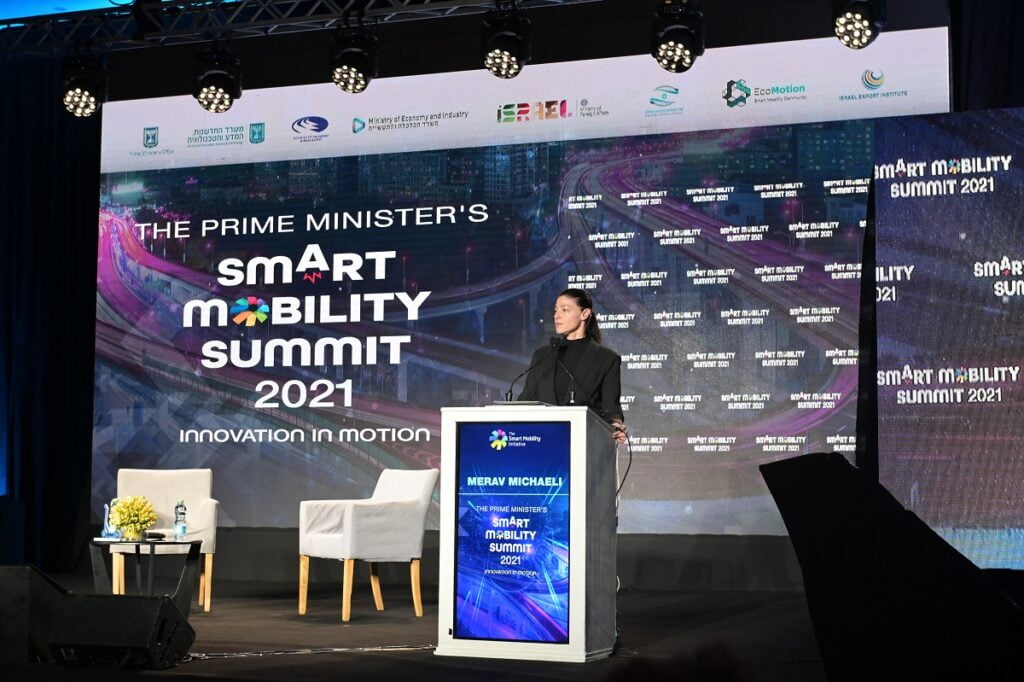
Photo by Hermon Azriper. Re-play Production.
Michaeli also said that Israel’s new state budget that recently passed includes the ministry’s goals to develop public, shared, and light transportation, such as micro-mobility and “old-fashioned” biking and walking.
“Yes, walking is a kind of transportation we need to get back to,” she said, “We so often think about the vehicles and forget about the humans who use them. Smart transportation remembers the humans and the society it has to serve. Real smart transportation enables every one of us not only to get to where we want smart, but to get to where we need in life, to enhance our possibilities.”
Israel in smart mobility
Israel is home to at least 500 startups and companies in the auto tech and smart transportation industry and while it doesn’t have a substantial base for auto manufacturing, it has emerged as a force to be reckoned with in the smart mobility sphere due to its expertise in sensors, algorithms, and all things related to auto technology. International auto giants like General Motors and Ford have sensed the high-quality potential of Israel’s high-tech industry in mobility tech and established a number of R&D and innovation centers to be part of this expertise.
Since it was nabbed by Intel in 2017 for a staggering $15 billion, Jerusalem-based vision sensor tech firm Mobileye remains one of the top Israeli companies making an impact on the mobility industry and the world. At the summit, Professor Amnon Shashua, co-founder and CEO of Mobileye and Intel Senior Vice President kicked off the event by referring to the status of autonomous driving and Mobileye’s plans to move forward in the industry.
“Autonomous driving is really going to be transformative for mobility,” Shashua said, noting that it will lower the number of accidents, lower the cost of mobility (in favor of public transportation), and reduce the number of cars on the road, Shashua boldly declared at the event.
Sign up for our free weekly newsletter
Subscribe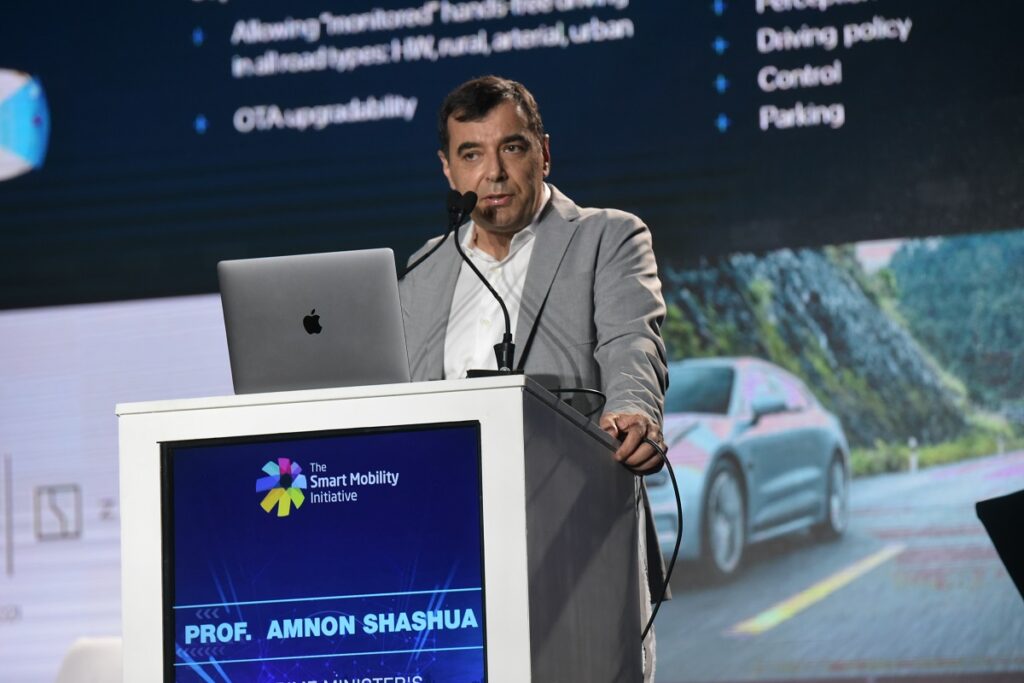
Photo by Hermon Azriper. Re-play Production..
The driving assistants of today, like front facing cameras, radar, or a LiDAR sensor are ready to intervene a fraction of a second before an accident, he explained. Shashua believes that soon more than half of all cars will come equipped with these driver assistants. “Today, 50 percent of all new cars on the road come with these devices — by 2026, it will be 76 percent.” This includes premium cars and lower class vehicles in the future. In these cars, the driver is still in charge, but he or she will be able to be disengaged for a small period of the drive.
Level four and five cars, which Shashua calls the “holy grail” of vehicles, are the fully autonomous cars where a driver can sit in the backseat of the car and enjoy the ride. For its part, Mobileye is “developing the entire spectrum because autonomous driving could play out in one or two ways — in the form of consumer AVs or robotaxis, taxis or shuttles that are owned by a company who own a fleet of these vehicles and will charge consumers for a drive,” he said.
“It will start with big cities, and gradually the number of autonomous cars will grow, and then some cities will not allow people to drive non-autonomous cars because they won’t have accidents and they will expand to other cities and in the end, there will be less of a need to buy a car. One could order a drive to where he wants, and in case of need, could intervene in the driving.
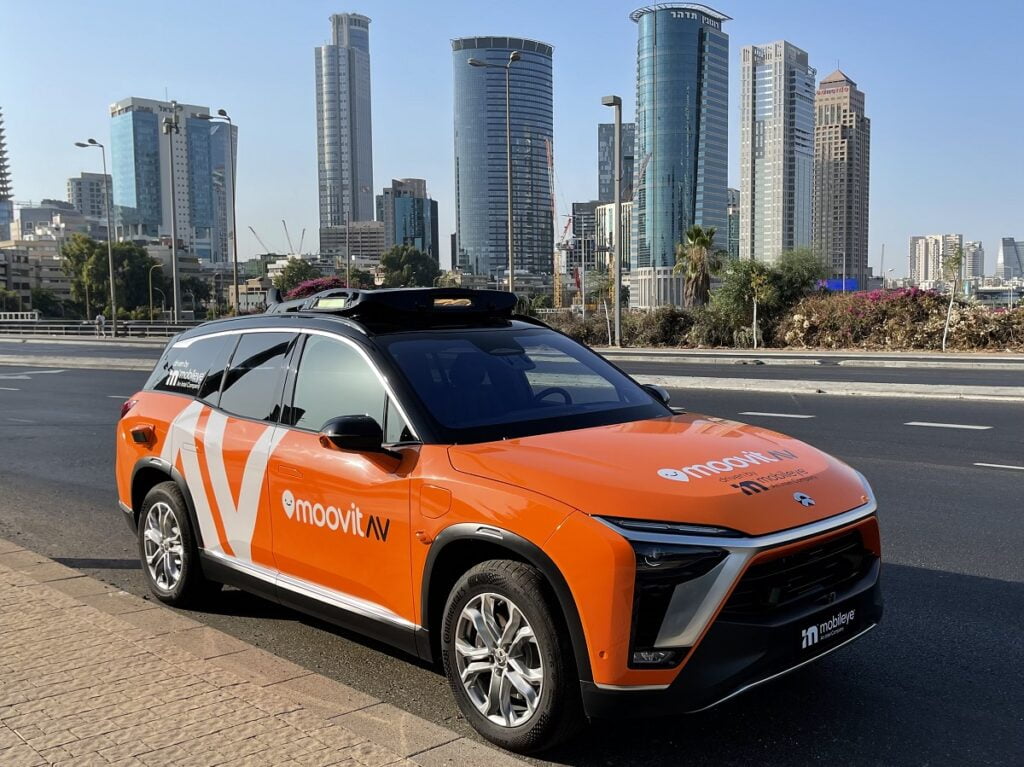
Shashua says the robotaxis will have supervision in the form of 11 cameras and will provide 90 percent of autonomous driving.
“We expect more than 100,000 vehicles like that in 2022,” Shashua said. In September, Mobileye and Intel revealed at the 2021 IAA Mobility show that Mobileye’s new self-driving robotaxi, powered by Mobileye Drive, the company’s fully integrated self-driving system, was being tested in Munich and would soon be ready for commercial deployment.
Mobileye will own the robotaxi fleet used in the service, while German-headquartered international car rental and mobility service provider Sixt SE will maintain and operate the fleet. The vehicles will include the MoovitAV service and SIXT branding once it launches and riders will have access to the service through the SIXT app.
Water-from-air tech in Ford vehicles
During the second day of the conference, it was announced that Ford Motor Company had approached Israel’s Watergen to collaborate in a project for Ford’s off-grid adventure and recreational vehicles. The global water generation leader would create the Watergen Mobile Box, the world’s first vehicle on-board water generating system to be pre-installed on Ford vehicles. The device is the first drinking system capable of extracting clean water from ambient air. It made its world debut on the Ford Ranger pickup at the Speciality Equipment Market Association (SEMA) show in Las Vegas.
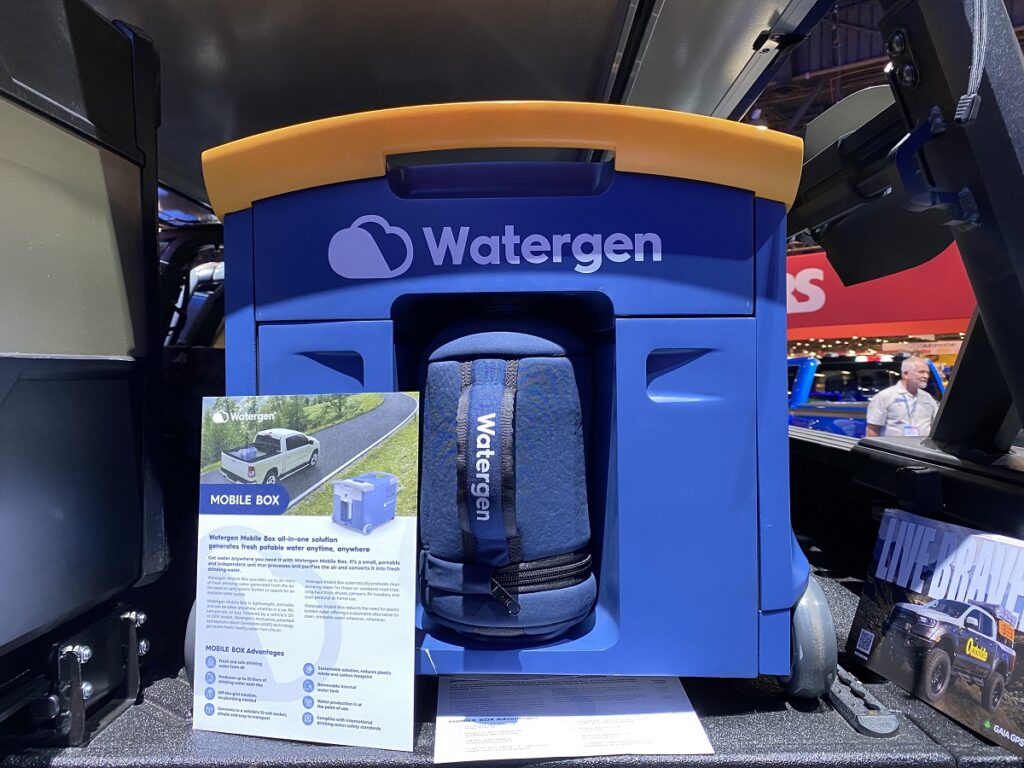
The announcement said the collaboration underlines Watergen’s goal to become a global automotive supplier.
Startups exhibition
Representatives from over 70 startups in the fields of smart transportation, urban mobility, mobility as a service, electrification, cybersecurity, connected vehicles, and drone tech showcased their companies and products in an exhibition where they demonstrated some of Israel’s newest solutions and developments in smart mobility.
Smart Mobility Summit 2021 #smartmobilitysummit2021 #Israel pic.twitter.com/n22TzLq6bU
— Insider Cyprus (@CyprusInsider) November 9, 2021
A number of firms with booths were companies that had gone public through IPOs or SPAC mergers in the past year, a noticeable trend among Israeli companies in the automotive and mobility fields as well as in the general local high tech industry. Companies that showcased included Arbe, a firm that supports drivers and autonomous vehicles with 4D ultra high-resolution imaging radar and the first imaging radar company issued on the NASDAQ, as well as Innoviz Technologies, a manufacturer of high-performance solidstate LiDAR sensors and perception software. Innoviz went public via SPAC merger in April at $1.4 billion valuation.
Related posts

Editors’ & Readers’ Choice: 10 Favorite NoCamels Articles

Forward Facing: What Does The Future Hold For Israeli High-Tech?

Impact Innovation: Israeli Startups That Could Shape Our Future



Facebook comments